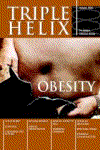One of CMF’s aims is ‘to promote Christian values, especially in bioethics and healthcare…’ and to this end we issue press releases and contribute to government consultations.[1,2] We are currently awaiting the Government’s response to three consultations, all of which closed over the summer.
The Department of Health’s Choosing Health? consultation covered a range of public health issues, including diet, exercise and alcohol consumption as well as more general questions about the balance between the state and individual responsibility, and how changes could be implemented. The Government plans to publish a White Paper later in the year, which will shape future policy and legislation.
The consultation comes at a time of increasing national concern about ‘the obesity epidemic’, addressed in this issue of Triple Helix.[3] In contrast to the developing world, Western society’s main health problems are those of abundance rather than poverty. Perhaps our search for solace in food, alcohol, sex, drugs or material things is a symptom of a greater spiritual problem.
The new Department of Health proposals, Excluding Overseas Visitors from Eligibility to Free NHS Primary Medical Services, appear to be an over-zealous response to public fears over ‘health tourists’ draining NHS resources. But whilst there are undoubtedly some wealthy visitors receiving free treatment at our expense, the main group of people to be affected will be failed asylum seekers. We have argued in our submission that this is both unjust and foolish: it is not in the interests of individuals, the general public or primary health professionals to create a marginalised semi-illegal group of people with no or limited access to primary health care services.
The Select committee on Lord Joffe’s Assisted Dying for the Terminally Ill Bill,[4] which is attempting to bring in Dutch-style euthanasia in the UK, is now hearing oral submissions. The full transcript of evidence is available online.[5]
The arguments for legalising euthanasia have shifted since a Lords’ committee recommended no change in the law in 1993. Then the focus was compassion for the suffering; now it is on patient autonomy. We have argued that euthanasia is unnecessary because compassionate alternatives exist, dangerous because of the slippery slope and morally and ethically wrong. Far from protecting patient autonomy, allowing assisted dying will undermine it, by creating pressure on vulnerable people, whether real or imagined, to request early death.
Although oral submissions have begun Christian doctors are still urged to write to members of the Select Committee with their views. An open letter and briefing paper on the bill along with links to CMF’s submission and the full text of the bill itself are available on the CMF homepage.[6] In a democracy we are all in one sense rulers who are responsible for the laws which end up on our statute books. It is our duty both individually and corporately to respond by being informed, praying, educating others and trying to influence the political process.
































